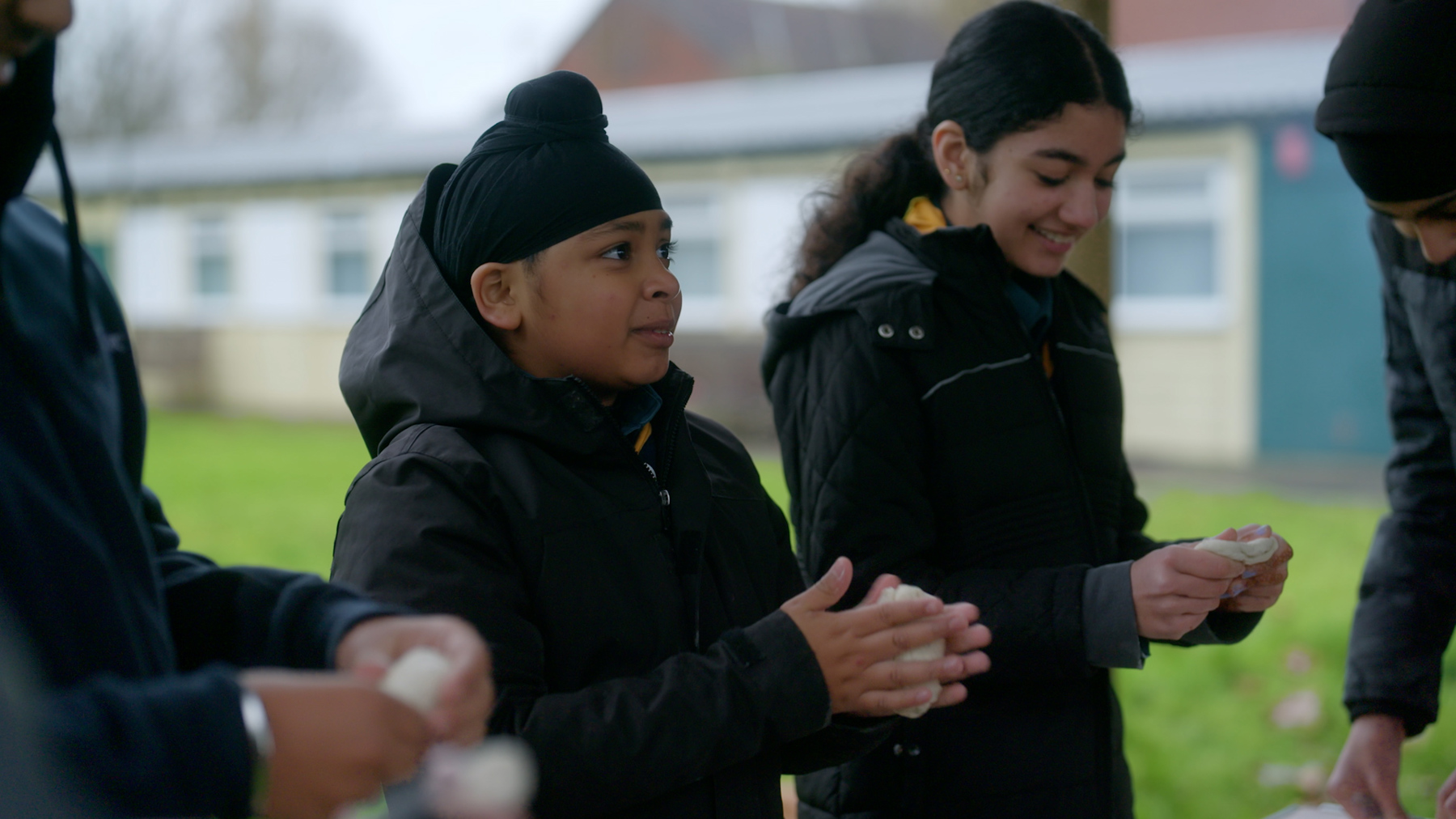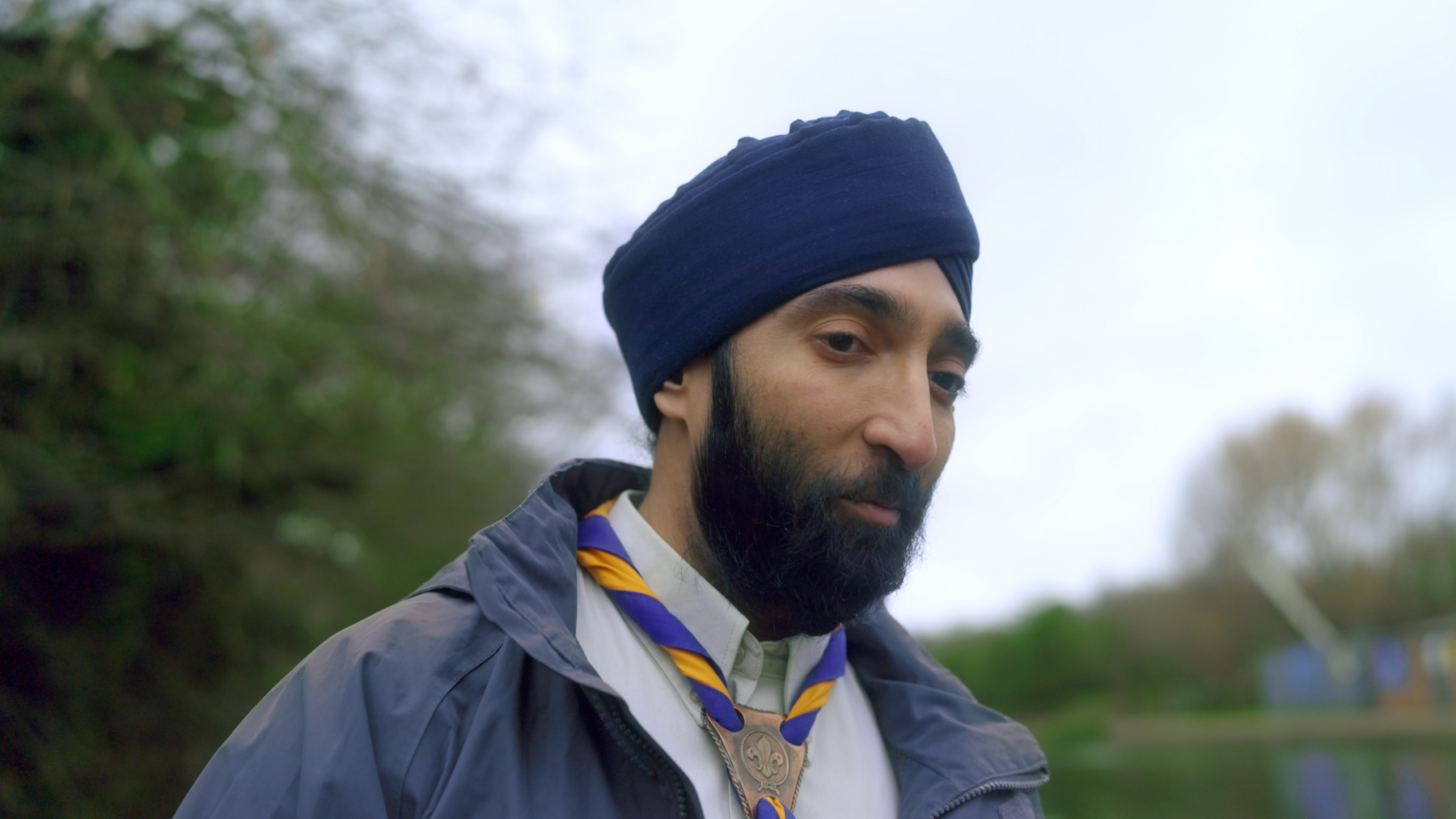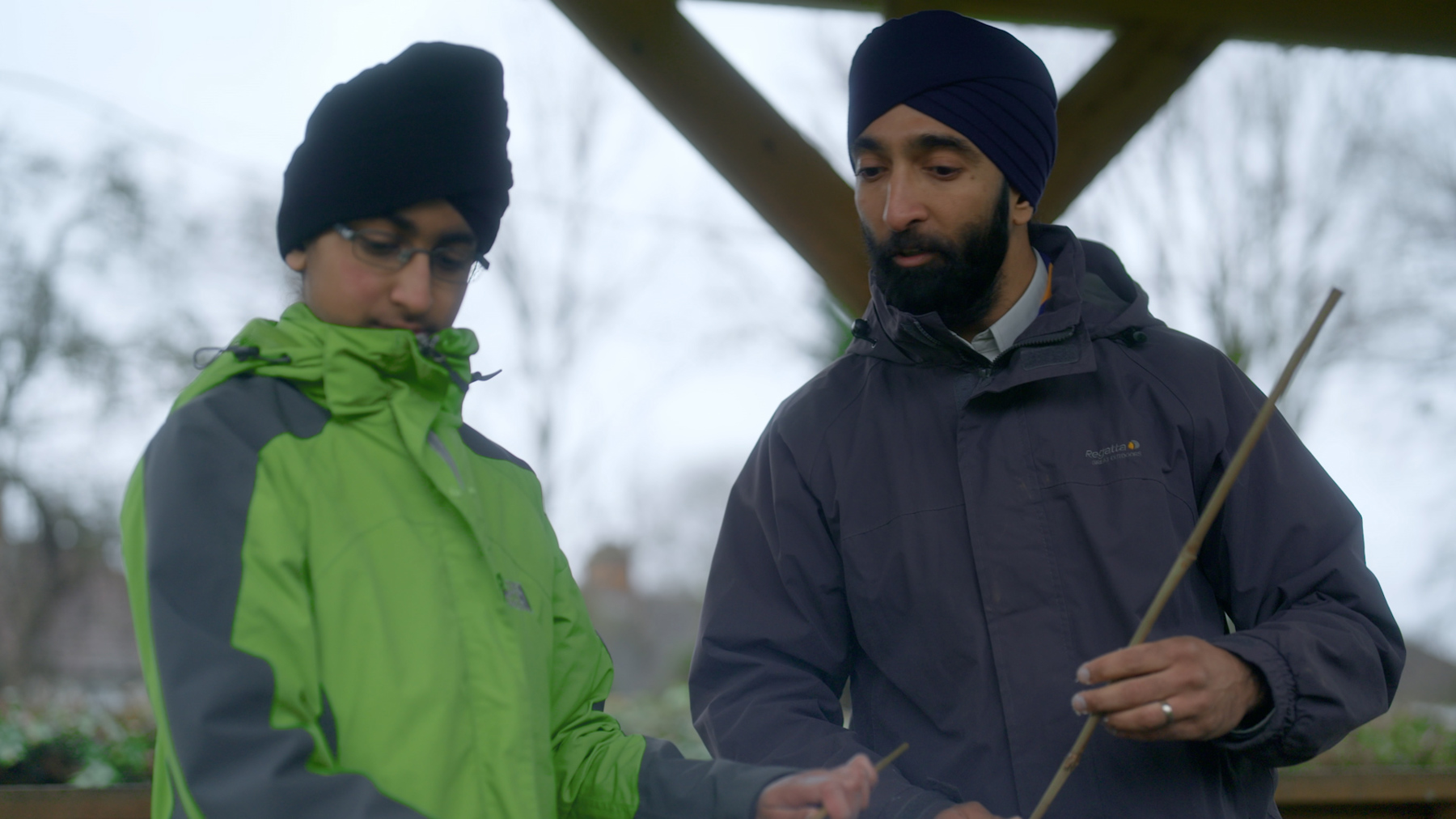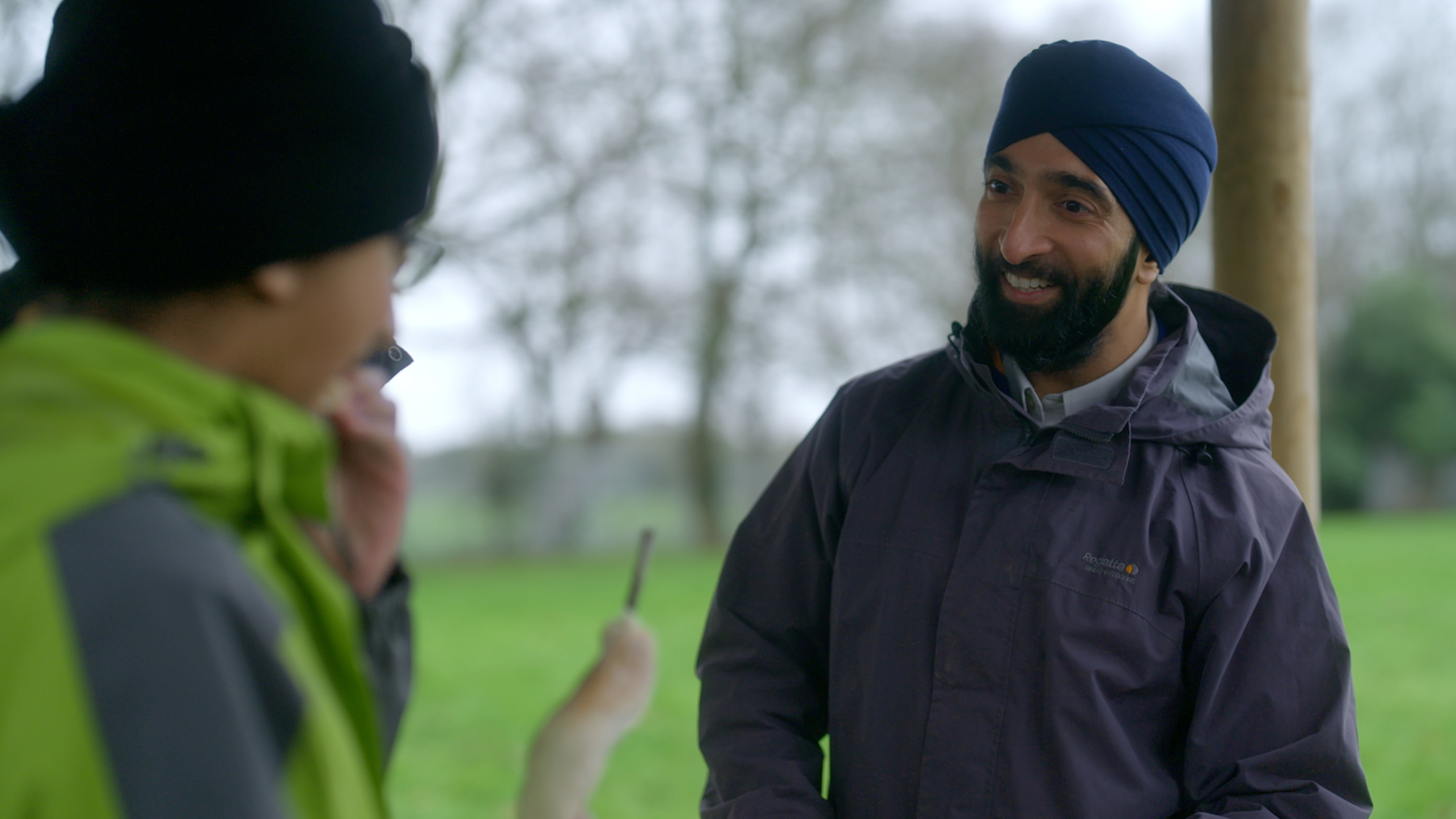What's Vaisakhi - and how's it celebrated
Vaisakhi is a Sikh festival, happening on the 13 April this year. Vaisakhi celebrates the founding of the Sikh community, the Khalsa, in 1699. It’s also known as ‘Baisakhi’.
Celebrated throughout North India, as well as around the world, Vaisakhi signals the start of spring. It marks the end of Harvest and celebrations include dancing, singing, colour and music. Vaisakhi usually happens on the 13 or 14 April every year.
Gurpal and Daljit are Scout volunteers in 13th Southall Scout Group. They’re practising Sikhs too – so we caught up with them to find more about Vaisakhi and how it’s celebrated.

How did you get involved in Scouts?
Daljit: Of course. I’ve been in Scouts for 25 years and help run Beaver Scouts and Explorer Scouts. We both really enjoy it!
Gurpal: For me, my favourite thing about Scouts is camping. We spend all year round working with our young people, building up skills and teaching new things (we learn lots of things as volunteers too!). It’s great to go camp and put everything together. Everyone’s a little bit out of their comfort zone, including the adults, but we all have so much fun. It’s great to know the memories last forever. We still hear our young people talking about previous camping trips!
Daljit: Everything Gurpal said. I really enjoy getting to experience camps that extend people’s boundaries. We’ve run international camps, and they give everyone involved an amazing opportunity. The friendships you make are incredible, and the trips allow both the young people and adults to grow through shared experiences. On one of our trips, we visited the Golden Temple, a central place in India for Sikhs. It was magical!
Gurpal: As well as fundraising, our young people help plan elements of the trips, such as transport, menus, accommodation and budgets, so they get to learn key skills for life while carrying out projects. The trips have been a fantastic way for us to show and live out both our Scout and Sikh values.
Daljit: In 2008, we went to Tanzania and built school for deaf and hearing-impaired children. In 2014, we built a dormitory, toilets and showers for orphaned girls in India to give them safe environment to live. We helped to build a room for responsible adults. We fundraised and worked with local people in our communities to raise the money – and learned bricklaying skills, too!

Can you tell us a little bit more about Vaisakhi?
Gurpal: Vaisakhi’s celebrated by Sikhs around the world. Vaisakhi has been a harvest festival in Punjab - an area of northern India for a long time. In 1699, Sikhs from all over the Punjab, in India, gathered to celebrate the local harvest festival of Vaisakhi. There was a ceremony by our tenth guru, Guru Gobind Singh. He came out of a tent carrying a sword and said, ‘if you want to follow the path unconditionally, you can come into the tent’. Guru Gobind Singh then asked for people to step forward.
Daljit: One man went into the tent with him. Soon Guru Gobind Singh came out of the tent alone, his sword covered in blood. Guru Gobind Singh then asked for another volunteer. This happened several times, until five Sikhs had gone into the tent. Everyone was very worried they had been killed by Guru Gobind Singh.
Gurpal: However, the five men came out of the tent alive. They became the first members of the Khalsa, which means ‘pure’. The Khalsa is a group of pure people.
Daljit: The five men became known as the 'Beloved Five'. Guru Gobind Singh initiated all the men into the Khalsa. He said prayers and anointed them with a holy water called Amrit. He then requested the ‘Beloved Five’ to initiate him into the Khalsa panth (Path). Being initiated is now an important stage of being a Sikh.
Gurpal: As Sikhs, we show our commitment, act of service and dedication to the Khalsa by adopting five symbols, or articles, of faith. They are a Kangha (comb), Kara (steel bangle), Kesh (uncut hair, covered by a turban and growing a beard), Kirpan (short sword) and Kachera (short briefs). These five articles of faith are symbolic and meaningful to Sikhs.
Daljit: The keeping of these five symbols connect us as Sikhs, it’s our uniform. Just like how in Scouts we’re all connected to other Scouts with our Scout uniform and Scout scarf or Necker.

How’s Vaisakhi celebrated?
Daljit: On the morning of Vaisakhi, lots of Sikhs go to the Gurdwara, a place of worship for Sikhs, for a service.
Gurpal: We go to the Gurdwara for prayers and to pay respect to scriptures. Scriptures are a living guru and living teaches for Sikhs.
Daljit: The community celebrates Vaisakhi with a procession through the streets with lots of singing, chanting and colourful clothes. The procession is called the Nagar Kirtan.
Gurpal: In the evening, Sikhs have a special meal with their loved ones, too.
How do you celebrate Vaisakhi within Scouts?
Daljit: Our group tend to celebrate in the Gurdwara. We take our Scout group in our Scout uniform to the community procession and it’s optional for them to join in. In the past, we used to have a float to be part of the procession and we also raise awareness of Scouts at a community stall. We’re hoping to attend this year, too. We also do some activities at Scouts and talk about Vaisakhi in our sessions.
Gurpal: In Beaver Scouts, we celebrate with colouring in and making mosaics of important symbols, such as the Khanda. The Khanda is the symbol of the Sikhs. We make pop up cards with Khanda in, these look fantastic and are good fun to make.
Daljit: ‘Singh’ was the surname given to every Sikh man on Vaisakhi in 1699. It means ‘lion’, so we do lots of lion crafts. Kaur was the surname given to every woman too and it means Princess.
Gurpal: Making lions out of paper plates is often a favourite!
Daljit: We also do puppet shows and tell the story of Vaisakhi. The young people really enjoy them, and they go down really well. They learn a lot from them.

Why do you think it’s important for us to learn about different faiths, and beliefs in Scouts?
Gurpal: I think it’s important for people to try and get over fear of the unknown – once we do that, we should realise there’s a lot in common between us all. We’re more alike than different.
Daljit: Learning about faiths, beliefs and different attitudes can help to break down barriers and help people to respect each other. It’s very important to learn about each other. The more we can build up respect and knowledge for each other.
Can you tell us a little more about the values of Sikhism?
Daljit: Sikhism focus on values of equality, social justice, service to community, tolerance and acceptance of other religions. We feel it’s important for people to know our values and ideals, such as generosity and working within a community to better it without any desire for distinction. We value kindness and compassion. We think it’s important to protect everyone’s right choose their own beliefs, rather than be forced or coerced into any path.
Gurpal: As Sikhs, our Gurus gave us this identity, so we should be practising and living our Sikh values, such as honesty, sharing with others and integrity, every day. Sikhism is also about acknowledging, supporting and respecting other religions, too. Our Gurus include teachings of other religions in our holy scriptures.

For you, how do Sikh values and Scouts values mirror each other?
Daljit: Personal spiritual development is an important part of being Sikh and is a journey, and we encourage and support others to explore their own personal spiritual development. Exploring our beliefs, faiths and attitudes is encouraged in Scouts too. In our Scouts group, we focus and work on values, with people from different backgrounds in our group.
Gurpal: The values taught in Sikhism align nicely to the values in Scouts. I always keep the values and ideals of Khalsa at forefront of everything I do. This lines up nicely with the Sikh Scout Promise I made. Both tell me to serve the community, to the best of my ability and effort, as well as to serve humbly. Being part of Scouts and volunteering helps me to put my Sikh values into practice.
Thank you to Gurpal and Daljit for speaking to us – and a happy Vaisakhi to all those who’re celebrating!